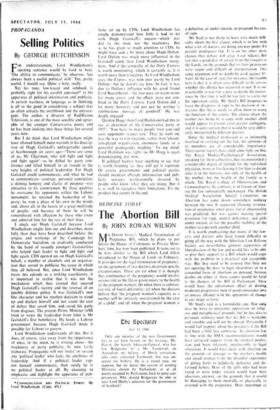Selling Politics
PROPAGANDA
By GEORGE HUTCHINSON
FOR understatement, Lord Windlesham's opening sentence would be hard to beat. 'The ability to communicate,' he observes, `has always been a useful political skill.' Yes, pretty useful, I should say. Quite a help, really.
Yet his tone, low-keyed and subdued, is probably right for his careful approach* to the apparatus of political information and publicity. A certain wariness, in language as in thinking, is all to the good in considering a subject that so often attracts the overblown and the extrava- gant. The author, a director of Rediffusion Television, is one of the most sensible and agree- able of the younger Conservative peers; and he has been looking into these things for several years now.
But I do think that Lord Windlesham might have allowed himself more warmth in his descrip- tion of Hugh Gaitskell's unforgettable speech at Scarborough six years ago—`There are some of us, Mr Chairman, who will fight and fight and fight again'—as he defied his party con- ference and lifted himself in an instant to the very heights of political leadership. For Hugh Gaitskell could communicate, and what he had to communicate—courage, personal conviction, a shining honesty and clarity of purpose—was attractive to his Countrymen. By these qualities he overcame his opponents within the Labor movement; he retained the leadership of his party; he won a place of his own in the minds and, above all, in the hearts of a great multitude of people; and because of them he will be remembered with affection by those who knew and admired him for the rest of their lives. .
I single out Hugh Gaitskell because Lord Windlesham singles him out and describes, more fully than they have been described before, the origins and workings of the Campaign for Democratic Socialism, so creditably conducted by the band of (usually younger) Gaitskellites who helped their leader to fight and fight and fight again. CDS opened up, on Hugh Gaitskell's behalf, a number of channels and an organisa- tion that served to publicise the cause in which they all believed. But, since Lord Windlesham treats this episode as a striking case-history, it is important to realise that it was not the mechanism which they created that secured Hugh Gaitskell's victory and the reversal of an ignoble defence policy. It was Gaitskell's own fine character and his resolute decision to stand up and declare himself and not count the cost of defeat that saved him, and- saved his party from disgrace. The present Prime Minister (wfft. tried to wrest the leadership from him) is Mr Gaitskell's first beneficiary. He heads a Labour government because Hugh Gaitskell made it possible for Labour to govern.
Lord Windlesham understands all this. But it does, of course, take away from the importance of what, in the main, he is writing about--the machinery of party publicity, by now fairly elaborate. Propaganda will not `make' or sustain any `political leader' who lacks the attributes a leadership. And if a political leader cap- not himself communicate, then surely he is no political leader at all. By choosing to emphasise and highlight the apparatus of ,pub- * COMMUNICATION AND POLITICAL POWER. By Lord Windlesham. (Cape, 45s.j
licity set up by CDS, Lord Windlesham has simply demonstrated how little it had to do with Hugh Gaitskell's success—which was due to the man, not the machinery. But as he has given so much attention to CDS, he might have said a bit more about Hugh Dalton. Lord Dalton was much more influential in the Gaitskell camp than Lord Windlesham recog- nises. And if the sympathy of the Daily Express is worth mentioning, which it certainly is, it is worth more than it receives. As Lord Windlesham says, the Expres.s was won over partly by Lord Dalton: but he doesn't say how. In fact, it was due to Dalton's influence with his good friend Lord Beaverbrook—the two were on warm terms for many years: and the effects were not con- fined to the Daily Express. Lord Dalton did a lot more, however, and not just by writing `a rumbustious message of goodwill.' He was deeply engaged.
Quintin Hogg (then Lord Hailsham) had this to say as chairman of the Conservative party in 1957: 'You have to make people trust you and your opponents respect you.' That, he went on, was the way to win elections, rather than 'chrom- ium-plated organisation, enormous funds or a powerful propaganda machine.' To my mind, Lord Hailsham was right—as Mr Hogg is again demonstrating just now.
If political leaders have anything to say that is worth listening to, they will get it reported. Of course governments and political parties should maintain efficient information and pub- licity services, professionally directed by people who know what they are doing. But it is as well to recognise their limitations. It's the product that counts in the end.






























 Previous page
Previous page